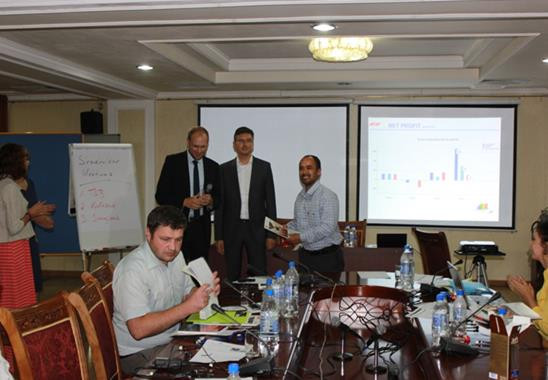
A bank employee who combines practical experience with theoretical knowledge, professional skills and personal qualities is the bank’s most valuable asset. Financial institutions can only remain competitive in free (financial) markets if they have the required expertise, knowledge and skills among their staff.
Taking this fact into account, the National Bank of Tajikistan issued an official recommendation to all financial institutions of the Republic of Tajikistan, stating that in order to ensure the stability of the financial sector of the country, it recommends for all staff members of banks and Microfinance Institutions (MFIs) working at the mid and top management level to undergo a one-year Top Management Training Course for Financial Institutions.
This course is offered by the Association of Microfinance Organisations in Tajikistan (AMFOT), a training programme developed by a team of AFC experts implementing the project “Microfinance and Financial Instruments” of the GIZ Programme “Framework and Finance for Private Sector Development” in Tajikistan.
For this purpose, the AFC expert team, jointly with the Center for Training and Development of Microfinance of Tajikistan (CTDMT) under AMFOT and the Academy of German Cooperatives (ADG) organized the second Annual Financial Academy between 26.08.- 30.08.2014.The training was of special interest for managers of Banks and MFIs, heads of risk management departments within financial institutions and supervisory and risk management department of the National Bank of Tajikistan (NBT).
This year’s Financial Academy focused on two topics of the highest urgency for the financial sector in Tajikistan: the management of operational risks and improved strategic and financial management skills. These topics were reflected in the two blocks in which the training programme was split.
Workshop 1 – Operational Risk Management. This workshop introduced the participants to the international best practice in managing operational risks (OpRisk) in financial institutions. The participants were given the opportunity to supplement their bundle of knowledge with issues such as:
- Types of operational risks;
- Reasons for introducing an operational risk management system;
- Operational risk management tools (operational risk event database, risk self-assessment, risk indicators and scenario analysis).
- This workshop was offered in two separate blocks to managers of financial institutions and the Risk Management Department of the NBT by Mr Walter Dutschke, Head of the German Chapter of the International Operational Risk Management Association.
Workshop 2 – Banking strategy and operational solutions helping to excel in a competitive environment.
This workshop gave a unique possibility to the participants to train their management skills through the banking simulation game. The trainer provided by ADG, Mr Marco Rimkus, used a specially developed banking simulation game. The comprehensive nature of this simulation game allowed to develop participants’ skills both in the strategic management area (required profit analysis, revenue management, balance sheet structure management, taking the decisions on marketing/sales) and in operational management (calculation of individual transactions, risk management and etc.).
The bank simulation covers and trains practical skills of many areas vital for operational banking:
- Target system of a banking institution with its basic conflicts between profitability, liquidity, security and growth;
- Dependencies between the target system and the divisions of a bank;
- Deposit/lending business under consideration of Basel II, commission-based transactions and investment banking;
- Integration of target system and divisions by the regulation of costs and revenue, capacity, balance sheet structure and risk;
- Personnel planning;
- Competition analysis;
- Development of marketing activities.
Experienced international trainers and practitioners were invited to conduct the Financial Academy and to share their expert knowledge based on international best practices. Their worldwide experience combined with real-life examples from their on-going work was quoted to be a “source of enrichment” for the top management participants of the Academy and ADG representative
In total, 19 people took part in the Financial Academy with the majority being the representatives of the biggest MFIs and banks in Tajikistan. This means that education remains top priority for key players in the (micro) finance sector.
It is gratifying to emphasize that 93% of the participants indicated that their expectations regarding the training contents were met, all participants described the training as effective or very effective and stated that they are able to use the training materials in their everyday work.
Considering the positive feedback received in the course of this year’s training programme for top management of financial institutions, the need to institutionalize a Financial Academy into a regular training institutions acknowledged by the regulators of the country and certifying FI managers becomes even more evident. The AFC expert team is thus currently developing plans on how the one-year training course for top managers of banks and MFIs recently introduced by AMFOT’s CTDMT with the support of NBT can be extended to include a certification process which will culminate in the annual Financial Academy.
For further details, please contact
Erika.buerkle [at] afci.de
